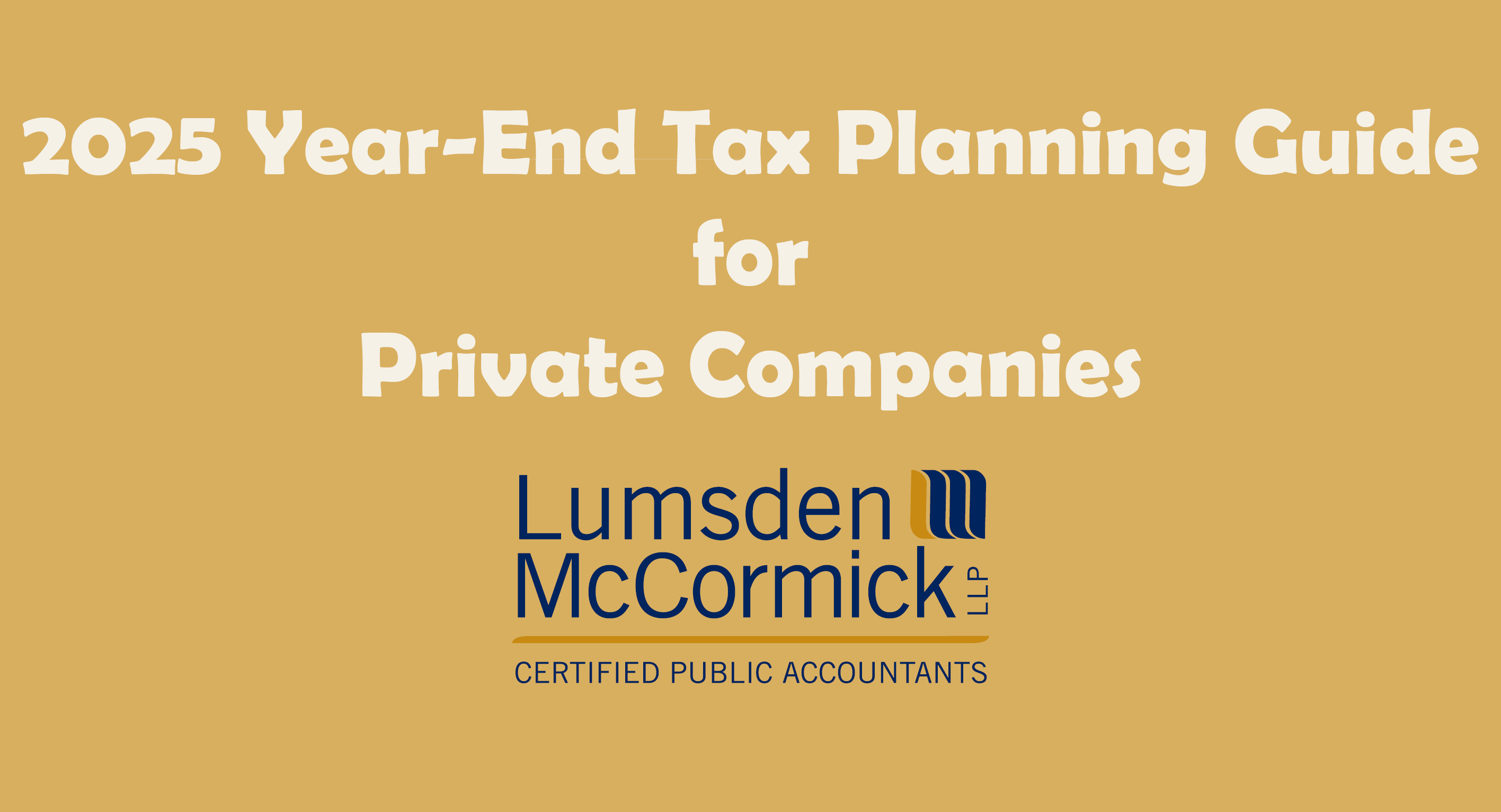Articles From Lumsden McCormick
Understanding the 2024 Yellow Book Update
Posted by Jenna Sheehan on December 03, 2025
Mark your calendars; the long-awaited revisions to the 2018 Yellow Book will take effect December 15, 2025. The changes were released in early 2024, but soon they will be the standard that government auditing is held to.
2025 Year-End Tax Planning Guide for Businesses - Private Companies
Posted by Cory Van Deusen V on December 02, 2025
Proactive planning is essential for private companies in the year-end planning period. Understanding evolving tax regulations is essential in order to optimize cash flow, mitigate risk, and position companies for the year ahead.
2025 Year-End Tax Planning Guide for Businesses - Public Companies
Posted by Brian Kern on December 01, 2025
As public companies prepare for year-end, a proactive and integrated tax strategy is essential for optimizing cash flow, reducing risk, and ensuring transparent financial communication with stakeholders. This guide highlights key areas that corporate tax and finance leaders should evaluate before the close of the fiscal year.
Pair a Living Trust with a Pour-Over Will
Posted by D’Marie Kleeman on November 26, 2025
Pairing a living trust with a pour-over will create a comprehensive estate plan that ensures all assets are managed and distributed according to your wishes. The living trust streamlines transfers and avoids probate for most assets, while the pour-over will act as a safety net for anything left out, maintaining consistency and privacy. Together, they offer flexibility, reduce stress for loved ones, and help prevent costly delays.
The Tax Factor: How It Can Make or Break Your M&A Deal
Posted by Cheryl A. Jankowski on November 24, 2025
Taxes play a critical role in the success of mergers and acquisitions, influencing both deal structure and financial outcomes. Whether a transaction is structured as an asset sale or a stock sale can significantly impact tax liabilities for buyers and sellers. Understanding these implications early helps avoid surprises and ensures a more strategic, tax-efficient deal.
Plan Ahead for End-of-Life Arrangements
Posted by Amanda Wojtkowski on November 20, 2025
Planning your funeral and memorial arrangements in advance can ease emotional and financial stress for your loved ones. By documenting your preferences and considering payment options—such as prepaid plans or a payable-on-death account—you ensure your wishes are honored and incorporated into your estate plan. Thoughtful preparation today provides clarity and peace of mind for your family.
Hosting Fundraisers that are Both Fun and Profitable
Posted by Jenna Sheehan on November 19, 2025
Successful fundraising events should balance enjoyment with profitability. Start by setting realistic financial goals, create a detailed budget, and look for cost-saving opportunities without compromising quality. Secure strategic sponsors and follow the 30% rule to ensure expenses don’t exceed 30% of net proceeds, making your event both impactful and financially sustainable.
Preparing Your Manufacturing Business for the Next Generation
Posted by Jonathan Roller on November 18, 2025
Succession planning is critical for manufacturing business owners who want to protect their company’s future. By defining goals, choosing the right ownership transfer strategy, and preparing successors through training and mentorship, you can ensure a smooth leadership transition and preserve your legacy. Starting early gives your successors time to learn, build relationships, and maintain operational stability long after you step away.
New Tax Break for Manufacturers: 100% First-Year Depreciation on Qualified Production Property
Posted by Kristin Re’ on November 17, 2025
The One Big Beautiful Bill Act introduces a 100% first-year depreciation deduction for nonresidential real estate classified as Qualified Production Property (QPP), offering significant tax savings for manufacturers. To qualify, properties must meet strict usage and timing requirements, and businesses should be aware of limitations such as nonqualified areas, leased buildings, and potential recapture rules. Careful planning and IRS guidance will be essential to maximize this benefit.
2025 Year-End Reminders Regarding Common Fringe Benefits, Special Rules for 2% S Corp Shareholders
Posted by Kristin Re’ on November 14, 2025
As 2025 draws to a close, employers should review whether they have properly included the value of common fringe benefits in their employees’ and (if applicable) 2% S corporation shareholders’ taxable wages.











